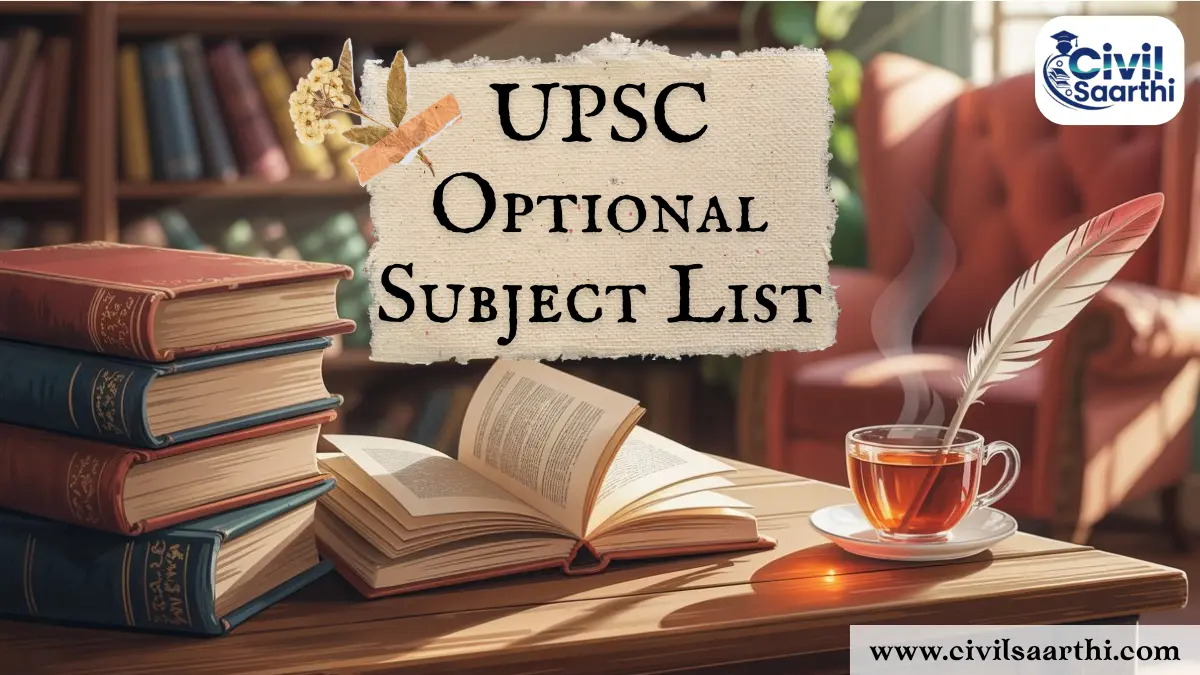The UPSC Optional Subject List offers 48 subjects for the Mains exam, carrying 500 out of 2025 total marks. Choosing the right optional is crucial as it can greatly impact your overall score and final selection. Despite its limited weight, its strategic importance is high. This guide covers all optional subjects, their relevance, success rates, and prep tips. A smart choice here can be a game-changer in your UPSC journey.
UPSC Optional Subject List
The UPSC Optional Subject List offers 48 subjects across Humanities, Science, Commerce, and languages for candidates to choose from. Popular options like Sociology, PSIR, Geography, and Anthropology are favoured for their syllabus overlap and resources. Selecting the right optional is key, as it greatly affects Mains scores. Aspirants should consider interest, familiarity, study material, and past success rates before deciding.
UPSC Optional Subject List: Overview
In the UPSC Mains Exam 2026, candidates must pick one optional subject, which includes two papers of 250 marks each making up 500 marks total. Though it’s less than one-third of the Mains score, it plays a crucial role in determining your final rank. Below is an overview of UPSC Optional Subject List for popular subjects.
UPSC Optional Subject List: Popular Subjects Overview | ||
| Subject | Stream | Key Advantage |
| Sociology | Humanities | Overlaps with General Studies, ample resources |
| Political Science & IR (PSIR) | Humanities | Structured syllabus, scoring potential |
| Geography | Science | Strong overlap with GS, scoring |
| Anthropology | Humanities | Scoring and conceptual clarity |
| Public Administration | Humanities | Good scoring, overlaps with GS |
| Literature (Regional/International) | Languages | Familiarity for language graduates |
UPSC Optional Subject List: List of Optional Subjects
There are a total of 48 subjects included in the UPSC Optional Subject List, out of which candidates are required to choose only one. While choosing an optional subject is subjective and should align with an individual’s interests and abilities, candidates have historically favoured certain subjects. Some popular UPSC Optional subjects include:
UPSC Optional Subject List Core Subjects
The UPSC Optional Subject List includes 25 core subjects catering to candidates with proficiency in various Indian and foreign languages.
UPSC Optional Subject List: Core Subjects | |
| S. No. | Subject |
| 1 | Agriculture |
| 2 | Animal Husbandry and Veterinary Science |
| 3 | Anthropology |
| 4 | Botany |
| 5 | Chemistry |
| 6 | Civil Engineering |
| 7 | Commerce and Accountancy |
| 8 | Economics |
| 9 | Electrical Engineering |
| 10 | Geography |
| 11 | Geology |
| 12 | History |
| 13 | Law |
| 14 | Management |
| 15 | Mathematics |
| 16 | Mechanical Engineering |
| 17 | Medical Science |
| 18 | Philosophy |
| 19 | Physics |
| 20 | Political Science and International Relations |
| 21 | Psychology |
| 22 | Public Administration |
| 23 | Sociology |
| 24 | Statistics |
| 25 | Zoology |
UPSC Optional Subject List: Literature of Languages
The UPSC Optional Subject List also includes 23 literature subjects catering to candidates with proficiency in various Indian and foreign languages.
UPSC Optional Subject List: Literature of Languages | |
| S. No. | Language |
| 1 | Assamese |
| 2 | Bengali |
| 3 | Bodo |
| 4 | Dogri |
| 5 | Gujarati |
| 6 | Hindi |
| 7 | Kannada |
| 8 | Kashmiri |
| 9 | Konkani |
| 10 | Maithili |
| 11 | Malayalam |
| 12 | Manipuri |
| 13 | Marathi |
| 14 | Nepali |
| 15 | Oriya |
| 16 | Punjabi |
| 17 | Sanskrit |
| 18 | Santhali |
| 19 | Sindhi |
| 20 | Tamil |
| 21 | Telugu |
| 22 | Urdu |
| 23 | English |
How to Choose the Right Subject from UPSC Optional Subject List
Choosing the right subject from the UPSC Optional Subject List is essential for scoring well and aligning with your strengths, interests, and available resources.
- Interest and Academic Background: The UPSC Optional Subject List favours subjects aligned with your prior education and passion.
- Availability of Resources: Access to study materials and guidance for your chosen optional subject in the UPSC Optional Subject List is crucial.
- Overlap with General Studies: Subjects from the UPSC Optional Subject List like History and Geography overlap with GS papers, providing study advantages.
- Scoring Potential: Review past trends within the UPSC Optional Subject List to identify high scoring subjects.
- Syllabus Complexity: Assess the breadth and depth of subjects in the UPSC Optional Subject List for effective time management.
UPSC Optional Subject List: Success Rates of Popular Subjects
The UPSC Optional Subject List shows higher success rates for subjects like Anthropology, PSIR, and Sociology. These are preferred for their scoring nature and GS overlap. Literature subjects also perform well among language graduates.
Success Rates of Popular UPSC Optional Subjects | |||
| Optional Subject | Candidates Appeared | Candidates Recommended | Success Rate (%) |
| Geography | 1916 | 105 | 5.5 |
| Sociology | 1263 | 126 | 10.0 |
| Commerce & Accountancy | 183 | 20 | 10.9 |
| Economics | 243 | 26 | 10.7 |
| Agriculture | 124 | 13 | 10.5% |
| Animal Husbandry & Veterinary Science | 16 | 3 | 18.8% |
| Anthropology | 1189 | 108 | 9.1% |
| Botany | 28 | 2 | 7.1% |
| Electrical Engineering | 200 | 16 | 8.0% |
| Chemistry | 156 | 13 | 8.3% |
| Geology | 30 | 0 | 0.0% |
| History | 751 | 51 | 6.8% |
| Law | 186 | 19 | 10.2% |
| Management | 54 | 6 | 11.1% |
| Mathematics | 539 | 45 | 8.3% |
| Public Administration | 705 | 58 | 8.2% |
| Civil Engineering | 146 | 15 | 10.3% |
| Statistics | 2 | 0 | 0.0% |
| Zoology | 44 | 4 | 9.1% |
| Political Science & International Relations | 1662 | 137 | 8.2% |
| Psychology | 164 | 15 | 9.1% |
| Mechanical Engineering | 213 | 12 | 5.6% |
| Medical Science | 247 | 26 | 10.5% |
| Philosophy | 439 | 27 | 6.2% |
| Physics | 165 | 12 | 7.3% |
UPSC Optional Subject List: Preparation Tips
The UPSC Optional Subject List requires strategic preparation based on your chosen subject. Focus on mastering the syllabus, analysing previous year papers, and using standard reference books. Regular answer writing practice is key to scoring well in Mains. Choose an optional that aligns with your interest and strengths for effective preparation..
- Understand the Syllabus of the UPSC Optional Subject List thoroughly.
- Use Standard Study Materials recommended for your chosen subject in the UPSC Optional Subject List.
- Practice Previous Year Question Papers from the UPSC Optional Subject List subjects.
- Schedule Regular Revisions for retention.
- Develop strong Answer Writing Skills for the optional papers listed in the UPSC Optional Subject List.
UPSC Optional Subject List FAQs
How many optional subjects are available in UPSC CSE 2026?
There are 48 optional subjects available across various disciplines.
Which subject is considered the easiest scoring optional?
Sociology and Public Administration are often considered scoring due to their concise syllabus and overlap with General Studies.
Can I choose Literature as an optional?
Yes, literature of various languages such as Hindi, English, Tamil, and Urdu is available as optional subjects.
How should I choose my optional subject?
Consider your interest, academic background, syllabus overlap with General Studies, availability of resources, and scoring potential.
Are engineering subjects available as optional?
Yes, subjects like Civil Engineering, Electrical Engineering, Mechanical Engineering, and others are available for candidates with a relevant background.
Does the choice of optional impact the final score?
Yes, the right optional subject can significantly influence your mains score and overall rank.
Can I change my optional subject after the preliminary exam?
No, the optional subject must be selected at the time of filling the mains exam application form.







